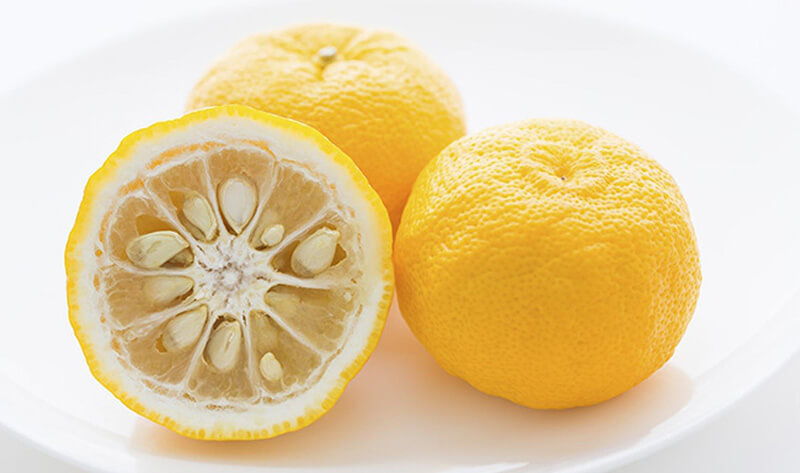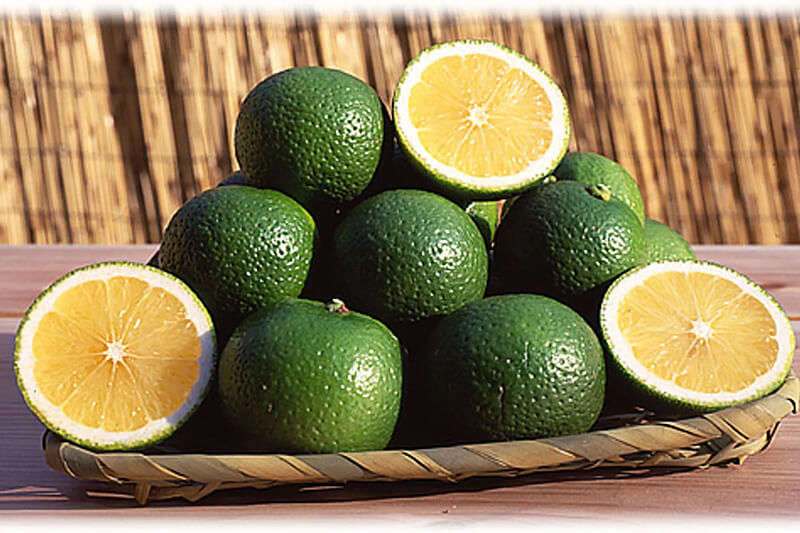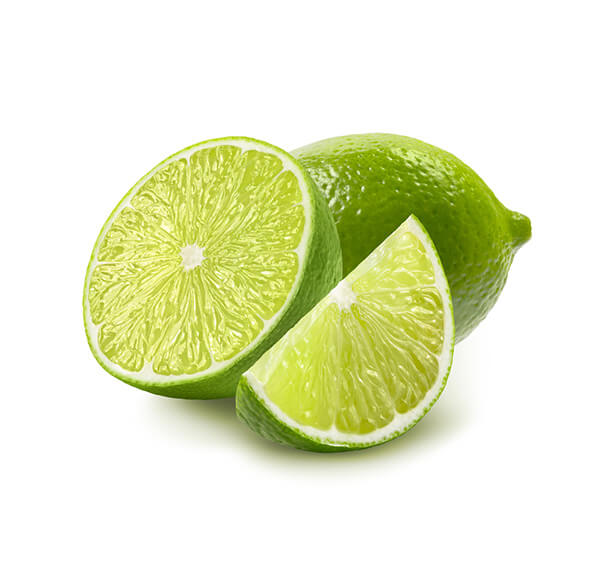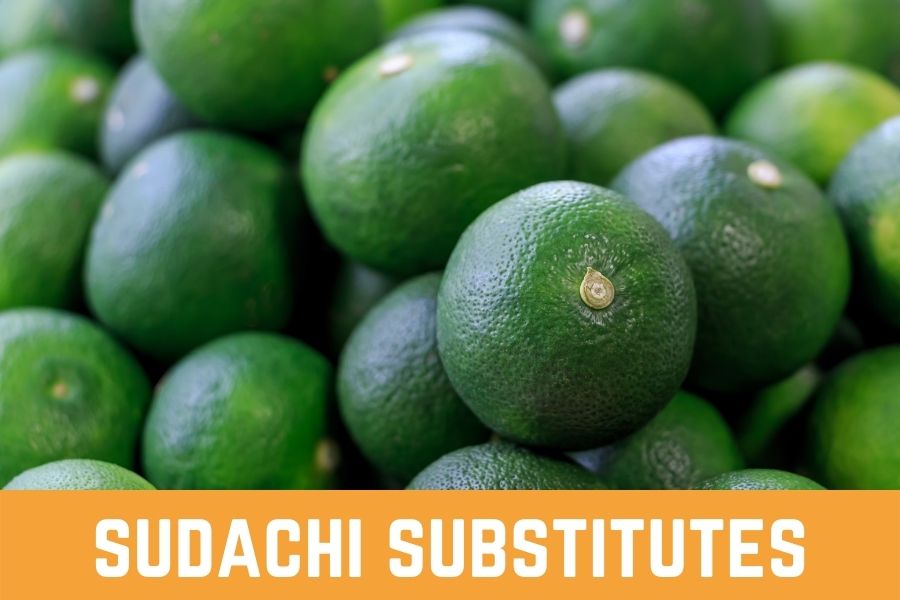Sudachi is a green-skinned citrus fruit that is often served alongside grilled achitori.
When squeezed tightly, the refreshing aroma and sourness of the juice enhance the flavor of the fish.
But when you are ready to use it, you may think, “I don’t have any at home! But when you want to use it, there are times when you think, “I can’t find it at home!” or “I can’t find it at the supermarket near me.
Oh no! I don’t have any sudachi. What should I do?
In this article, I’ll introduce you to some sudachi (citrus fruit) substitutes that you can use when you’re in trouble.
What are the characteristics of sudachi?
Sudachi is a member of the tangerine family, but as you know, it is not as sweet as a tangerine.
It is characterized by its strong sourness. For this reason, sudachi, along with yuzu and kabosu, are sometimes referred to as “vinegared mandarin oranges.
Sudachi is small, about the size of a golf ball, and is usually cut in half and served with grilled fish.
It has a refreshing sourness and a distinctive aroma, and by squeezing the juice over the fish, “the raw smell of the fish is reduced and the taste of the food is enhanced.
The nutrients contained in sudachi are vitamin C and citric acid.
Vitamin C is essential for building collagen and is an ingredient that can be used for beauty benefits.
It also helps to prevent oxidation. Therefore, squeezing sudachi on a piece of achiote fish, which contains nutrients that are vulnerable to oxidation, makes solid nutritional sense.
When choosing a substitute, it is a good idea to consider these characteristics.
5 sudachi substitutes
Substitute for sudachi 1: Lemon

One of the sourest fruits is the lemon.
The skin is yellow and the size of a lemon is about the size of your palm, so it looks a little different, but it is a member of the tangerine family.
Also, lemons are very rich in vitamin C, which makes them a good alternative to sudachi.
As for the flavor of lemon, it is a little different from sudachi.
In particular, you will notice a noticeable difference in the aroma.
This is because lemons do not contain some of the aromatic components that are found in sudachi.
This is because lemons do not contain some of the aromatic components found in sudachi, such as sudachi-chin, which is unique to sudachi.
When using lemon as a substitute for sudachi, it is important to be aware of these differences in flavor.
Although it is different from sudachi, it is hoped that you can enjoy the “refreshing aroma” of lemon.
Substitute for Sudachi 2: Yuzu

Like sudachi, yuzu is a member of the tangerine family with a strong sour taste.
Many people feel that the aroma of yuzu is more similar to that of sudachi than that of lemon.
Due to its high vitamin C content, it can be used as a substitute for sudachi without any problems.
The scent of yuzu is said to be “comforting” and “soothing. Lemons came to Japan in the Meiji era (1868-1912), but yuzu was already being cultivated in Japan in the Nara era (710-794).
Perhaps the reason why the scent of yuzu is so familiar and calming is because of the long history that Japanese people have been associated with it.
The peel of the yuzu tree is particularly rich in vitamin C, so not only the juice but also the thinly sliced peel is sometimes used for flavoring.
I recommend slicing the peel into thin half-moons and serving it with grilled fish, or mixing the chopped peel into sauces!
Substitute for Sudachi 3: Kabosu

Among the sour mandarin oranges, the kabosu is said to be similar to sudachi in its green color.
Kabosu also contains a lot of vitamin C, but it is particularly rich in citric acid, which is effective in promoting recovery from fatigue, and its content surpasses that of sudachi.
It is a good substitute for citric acid.
It has a flavor similar to sudachi, but the aroma of kabosu is also unique.
When using it as a substitute, it is a good idea to make sure that no one is uncomfortable with it.
The mild sourness of Kabosu does not overpower the taste of the ingredients or the seasoning of the dish, and it works as a well-balanced complement.
Substitute for Sudachi 4: Lime

Limes are another citrus fruit that has a distinctive aroma and sour taste.
Like kabosu, limes are rich in citric acid, and when you are tired, you can squeeze lime to help relieve fatigue.
It also contains vitamin C, but the content is not as high as that of sudachi.
The flavor of limes is said to be similar to that of lemons, but perhaps because they are picked before they are ripe, they have a slightly younger and sharper aroma.
When squeezed on grilled fish, you can enjoy a fresh flavor that is different from that of sudachi.
Substitute for Sudachi 5: Vinegar

If you don’t have sudachi (citrus fruit), lemons, or kabosu (a type of citrus fruit), and you still want to add a sour taste to your food, vinegar is a good last resort.
It is a standard seasoning, so you probably have it in your kitchen all the time.
When eating grilled fish, instead of squeezing sudachi (citrus fruit), add a dash of vinegar. The sourness of the vinegar enhances the saltiness of the fish, making it a surprisingly tasty dish.
You can add a little more salt than you would by using more soy sauce, so it is not only delicious but also healthy.
Vinegar contains citric acid, but unfortunately, it is not a good source of vitamin C.
Because it lacks the distinctive aroma of citrus fruits and sudachi, that point is also a little sad.
Conclusion
- The refreshing sourness and aroma of sudachi (citrus fruit) counteracts the fishy smell of fish and enhances the taste of food.
- Sudachi is rich in vitamin C and citric acid.
- The following six substitutes for sudachi are recommended. [lemon, yuzu, kabosu, lime, vinegar].
